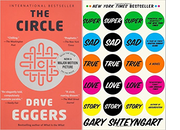Super Sad True Love Story by Gary Shteyngart Published: 2011 Read from: 01 Dec to 29 Dec My rating: 🌟 🌟 🌟 🌟
No sooner had I finished The Circle and raved about it to a friend who is a voracious reader and whose opinion I trust than she had me reading Super Sad True Love Story. There are similarities, which is why I am reviewing them together. Both are set a few minutes into the future and both of them are thoroughly dystopian. Both of them also accelerate inexorably and intensify to something of a climax. Both are equally scary, although paradoxically SSTLS, which on the surface is much more violent and unfathomable, is much harder to take seriously.
Synopses are plentiful enough, but I’ll add my own. The Circle is the unlovely love-child of Google and Facebook, with maybe a smattering of Twitter thrown in for good measure. A young woman gets a job there and drinks the Kool-Aid, even as the good friend who got her into all the all-seeing, all-knowing Circle begins to have doubts. Things go from bad to worse, and of course there are watertight, logical justifications for each little step. And then, just as you think to yourself, “Aha! Redemption!”, cometh the sucker punch.
SSTLS is a little harder to place, at least for me, because I don’t generally read this kind of thing. The defining element seems to be an America in free-fall, its economy shot to pieces, its government in disarray, its citizens reviled. There’s a big nasty corporation (there always is) which, among other things, is promoting immortality to those who can afford it. There's an all-seeing, all-knowing gizmo too. The love story is that of an older, Russian-Jewish-American immigrant son for a young and lovely Korean-American daughter, and the usual tropes that you might expect are all present and correct. And, of course, things go from bad to worse but then, maybe, they get a little better.
Are these books science fiction? I’m not sure, and I’m not sure it would be useful to discuss them in that light. There's a bit of science, or rather technology, and at that level The Circle is a little more believable than SSTLS. Wearable computers, small, high-res webcams, medical telemetry, drones, helpdesks and feedback; all are here, now. Dave Eggers pushes them forward just enough to move his story along. The same goes for some of the biotech that Gary Shteyngart uses, the calorie restriction, the antioxidants and free-radical scavengers, the DNA repair and what have you. His technology, not so much.
The Circle was published in 2013, and five years on the slightly more intrusive technology seems even less futuristic and the story Eggers tells with it eminently believable. SSTLS is older, 2010, and in some respects even more prescient, given what's been going on in the past year. Both books are a treat to read, Eggers because he really knows how to write a sentence, Shteyngart because he develops some lovely, wacky styles for his communication channels of the future.
Here’s one from The Circle:
Why was there so much animosity in the world? And then it occurred to her, in a brief and blasphemous flash: she didn’t want to know how they felt.
And one from SSTLS:
I had no idea that some unknown individual or group of individuals would breach my privacy and Eunice’s to pillage our GlobalTeens accounts and put together the text you see on your screen.
Nice touch that, given that I was in fact reading on my Kindle.
In the end, though, I found it hard to believe that even a big, evil corporation would be able to blow a Staten Island ferry out of the water, and therefor not nearly as engaged with the future of SSTLS. That a big, evil corporation could know more about me and my friends than I know myself, that it could create no hiding place for corruption while becoming utterly corrupt itself, that is all too believable.
Having finished both books in quick succession, I thought I had done with this sort of thing for a fair old while. Enough is enough. However, I then made the mistake of chatting about both books with yet another friend whose opinion I trust, and now I have a reading list of four titles, all pretty well-known to people who like this sort of thing. I may yet get round to them.
My review on Goodreads.
Buy The Circle at an independent bookshop
Buy Super Sad True Love Story at an independent bookshop
Webmentions
Webmentions
Webmentions allow conversations across the web, based on a web standard. They are a powerful building block for the decentralized social web.
If you write something on your own site that links to this post, you can send me a Webmention by putting your post's URL in here:

Comments